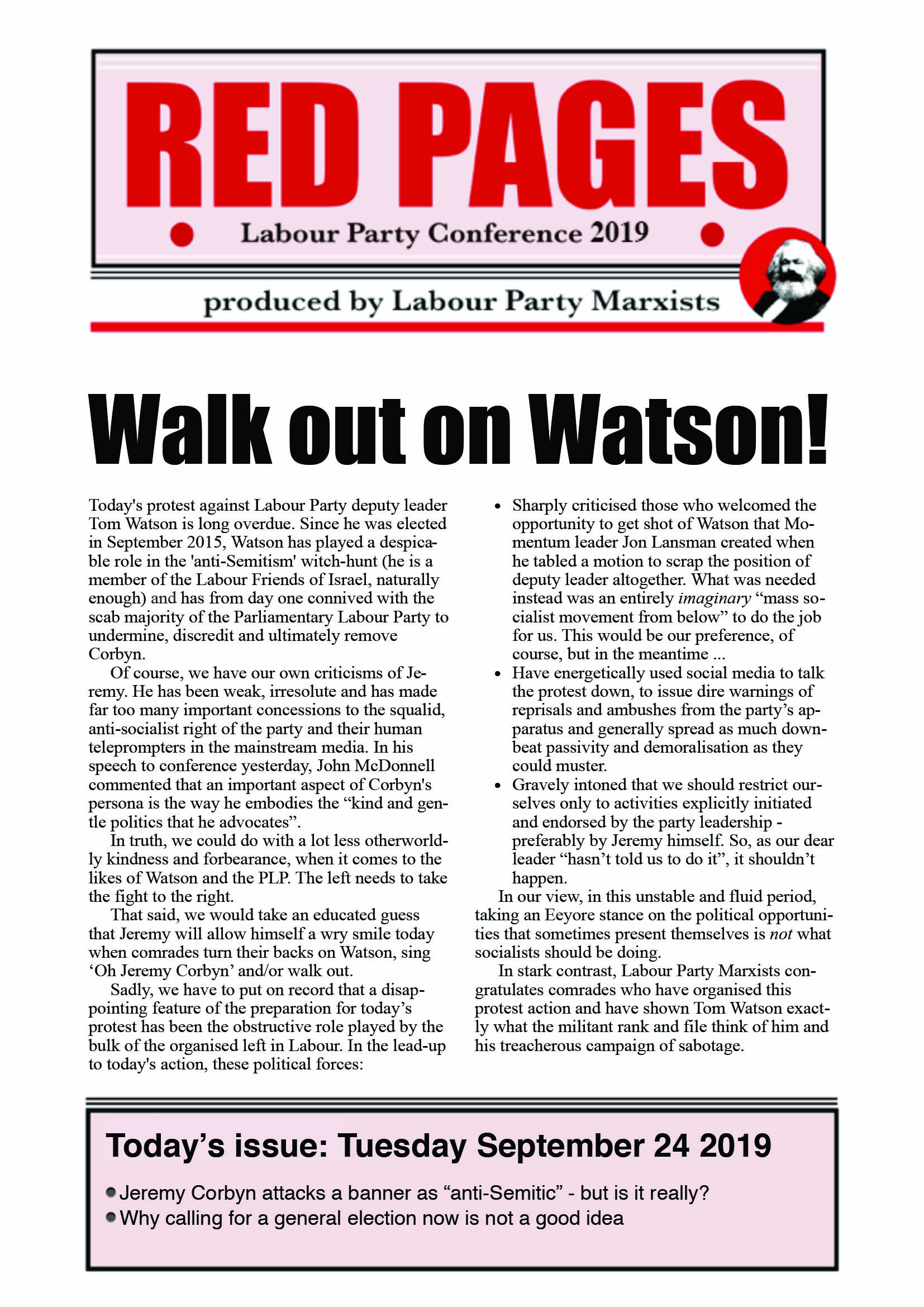James Marshall warns that, while Boris Johnson may well hanker after an illiberal democracy, calls for a caretaker government and a second referendum are worse than useless
Labour has successfully been manoeuvred into supporting a second referendum. Frankly, that neatly dovetails into the Boris Johnson-Dominic Cummings game plan.
Having established a firm grip on the executive arm of government, Johnson and Cummings still envisage token talks with Brussels, riding roughshod through the EU (Withdrawal) (No2) Act – the Benn Act – and then, “do or die”, finally delivering Brexit on October 31. A ‘people versus the elite’ general election would quickly follow.
Meanwhile, unless 11 Supreme Court judges decide otherwise, both Commons and Lords are not only prorogued till October 18. The remain camp is hopelessly divided and seems incapable of doing anything decisive to stop Johnson and his Brexit. Symptoms of what Karl Marx famously called the incurable disease of “parliamentary cretinism.”[1]
Jo Swinson has switched the Liberal Democrats from ‘second referendum remain’ to ‘general election revoke’. Jeremy Corbyn has been dragged into adopting a second referendum after a general election position. As de facto leader of Labour’s rightwing backbenchers, Tom Watson insists on a second referendum before a general election. As for the Scottish National Party, it supports a second EU referendum call, but with a beady eye to holding a second independence referendum for Scotland.
Amongst the many desperate ideas, one is to install Jeremy Corbyn as “caretaker” prime minister.[2] Of course, that will require gaining support from the SNP, the Lib Dems and the gaggle of former Labour and Tory MPs. It also opens the door to another “caretaker” candidate – if the Lib Dems, SNP and former Labour and Tory MPs find Corbyn unacceptable. Step forward a Ken Clarke, a Harriet Harman or a Keir Starmer. After all if stopping a no deal Brexit is the most important question facing the United Kingdom, surely Corbyn is obliged to do his patriotic duty. Make way for someone else for the sake of queen and country. But, no, Corbyn as “caretaker” prime minister, is “non-negotiable”, insists shadow chancellor, John McDonnell.[3]
It is highly unlikely that there will be a second referendum. Boris Johnson will not go for it … though he is doubtless delighted that Jeremy Corbyn has fallen into the elephant trap.
Yet imagine, for one moment, that the remain camp overcomes its paralysis and succeeds in getting a government committed to holding a second referendum. What would the result be?
While opinion polls show clear majorities wanting a “say” on any final Brexit deal, a remain victory is far from certain. YouGov (September 4) has 46% remain and 43% leave; Panel base (September 6) 52% remain and 45% leave; and Dextral (September 7) 46% remain and 40% leave.[4] The sort of margin we saw at the beginning of the June 23 2016 referendum campaign.
Because things are too close to call, the likes of Tony Blair and Justine Greening have proposed a three-option referendum (obviously in order to guarantee their desired result). Through perpetuating such a blatantly dishonest trick, argues David Jeffrey, a lecturer in politics at Liverpool university, it is theoretically possible for just 34% of voters to decide the “winning option”.[5] With the right questions placed on the ballot paper, such a referendum would see two bitterly opposed leave camps and a comparatively aloof remain campaign.
If a preferential vote is added into the formula, then the least popular option would be eliminated and there would be a count-off between the last two questions … and, so remain would, so goes the calculation, emerge the winner with over 50% of the vote.
Even barring such transparent forms of cheating, say remain narrowly won in a straightforward two-option referendum, what do we expect the 49% (or whatever) – ie, those who vote leave – to do? Sit on their hands? Cosily unite with remainers in the national interest? Hardly.
No less to the point, Labour, presumably, will be squeezed in a general election, held either before or after any such second referendum. If they play their cards right, Johnson and Tories can count on mopping up the Brexit Party vote and maybe, as a result, capturing a few seats in the English midlands and the north: seven in every 10 of Labour’s constituencies voted leave on June 23 2016. And having been shunted into the remain camp, Labour has to fight the resurgent SNP in Scotland and the resurgent Lid Dems in London and the south east. Not a good position.
Jeremy Corbyn could conceivably pull off another miracle, as he did in 2017. But, unless the ongoing trigger ballots have seen a thorough going purge of the Parliamentary Labour Party, the majority of sitting Labour MPs will continue to be an enemy within. They will continue to disrupt, sabotage and smear.
Popular front
Much of what passes for the left is utterly confused, is utterly disorientated: eg, Boris Johnson is a “pound shop Mussolini”, who on September 9 carried out a “coup” and an “assault on democracy” (Alliance for Workers’ Liberty). No, Johnson acted entirely within the existing semi-democratic monarchical constitution. That said, the prognosis offered by these social imperialists is not entirely wrong.
Brexit points towards a low-tax, low-regulation, low-rights economy. The working class can only but suffer. But their cure amounts to cyanide: “a strictly single-shot caretaker government which will send the Brexit-extension letter to the EU and call a general election.”[6] Okay, the PM might possibly be Jeremy Corbyn … or a Ken Clarke, or a Harriet Harman, or a Keir Starmer. But who will be the chancellor of the exchequer? Who will be home secretary? Who will be minister of defence? Etc, etc. Unmistakably a recipe for popular front negotiations to be crowned by a government of national unity.
Another, strange, proponent of this line is Paul Mason. Though he’s made the long march from Trotskyism to wizard wheeze techno-reformism, he cannot, surely, have forgotten the history of the 1930s, that he once treated as an article of faith when he was a member of Workers Power. Anyway, here is what he wrote in The Guardian:
The popular front tactic has deep antecedents in the very political traditions the modern Labour left emerged from. In 1935 the Bulgarian communist leader, Georgi Dimitrov, single-handedly manoeuvred the Communist International into supporting calls for a ‘popular front’ against fascism. This was about formal electoral pacts with centrist socialists, left nationalists and liberals – and it paid off within six months. In Spain, to the fury of conservatives, who had formed their own electoral alliance with the fascists, the popular front took power in January 1936.[7]
Mason’s argument is, in fact, so absurd, that his good faith must be called into question. Either he has suffered some kind of brain storm, that or he is baiting his old comrades. Clearly Mason relishes his new found role as a ‘blue skies’ thinker for the bourgeoisie, but presumably he cannot resist scandalising the old-fashioned Trotskyites who inhabit the deeper reaches of the Labour Party. As for the rest of his audience. He presumably holds it in such contempt that he does not even expect the most cursory Wikipedia fact-checking exercise.
With the least investigation Mason’s account of the Spanish popular front and popular fronts in general, proves to be entirely bogus. Behind the figurehead of Georgi Dimitrov there stood Joseph Stalin. It was he, Stalin, not Dimitrov, who ‘single-handedly’ manoeuvred the Communist International into supporting popular fronts. Paul Mason does not want to tell this inconvenient truth. His Guardian readers would be repelled. But then there are the unrepentant Straight Lefitsts – Seamus Milne, Steve Howell and Andrew Murray – serving as Jeremy Corbyn’s principle advisors. Maybe they, as good Stalinites, welcome Paul Mason’s conversion to popular frontism. Maybe elevation awaits?
Historically the Communist International (and before it the First and Second Internationals) championed working class independence. In other words the project of socialism as opposed to the project of a reformed capitalism. A united front between working class parties was considered legitimate. This tactic involved presenting reformist socialist and social democratic parties with a package of campaigning demands with a view to advancing the interests of the working class.
Primarily though, this approach was designed to win over the mass of the working class to the Communist Party. The calculation being that the leaders of the socialist and social democratic parties would either fight half heartedly, that or they would prefer unity with the bourgeoisie to the unity of the working class. It should be stressed that Comintern’s tactic involved real parties of the working class. Not miniscule sects such as the SWP, SPEW, the Morning Star’s CPB, etc, etc.
Taking seats in a bourgeois cabinet, supporting one (lesser evil) bourgeois party against another (greater evil) bourgeois party was explicitly ruled out. Needless to say, Stalin definitively broke with that tradition in 1935. Under irresistible pressure from Moscow, the world’s communist parties were instructed to support ‘progressive’ capitalist governments (potential diplomatic allies of the Soviet Union). Naturally, towards that end, all notions of proletarian social revolution had to be put on the back burner.
The ‘official’ Communist Party of Great Britain encouraged the Labour Party to join with it an anti-fascist popular front alongside an assorted mish mash of soft conservatives, liberals and well meaning pacifists, actors and vicars. The Independent Labour Party and the Socialist League was drawn to that perilous orbit, not least due to the prestige of the Soviet Union and the palpable threat of Hitler fascism. However the Labour Party itself steadfastly resisted: ironically in the name of working class independence.
Likewise it appears to escape Mason’s notice that the Spanish republic was defeated in a civil war. Its partisans were butchered on an industrial scale. As many as 200,000 are thought to have been killed after the war had finally finished. General Franco wanted revenge.
In fact, the political compromises necessitated by the popular front directly, inescapably, contributed to the horrendous defeat. Eg, the ‘official’ communists opposed colonial independence movements. Stalin did not want to upset ‘anti-fascist’ imperial powers. In Spain crucially that meant opposing independence for Morocco, the main base of Franco’s mercenary army. Rather than appeal to the Moroccan masses and win them to the fight against Francoism, the Spanish republican government loyally upheld the constitutional order.
The logic had to be counterrevolutionary. Those seeking, albeit often hamfistedly, to push things forward to a full blown social revolution, were branded enemies of the people, even a Francoist fifth column. Thousands of anarchists and POUM members were tortured and executed. In short, the ‘official’ communists in Spain acted not like Bolsheviks in October 1917, but like the rightwing of the Menshevik Party who joined the February 1917 Provisional Government.
Reaction
A popular front that stops Brexit would undoubtedly unleash a storm of reaction. Chauvinism, xenophobia and imperial nostalgia will not easily surrender. Boris Johnson, Jacob Rees Mogg, Dominic Cummings, Nigel Farage, Tommy Robinson, the DUP, Britain First, the Football Lads Alliance can only but be expected to loudly bang the great betrayal drum. Their message well rehearsed. The leave campaign won the June 2016 referendum fair and square. The votes of 17.4 million people have been ignored, treated with contempt. Britain remains shackled to Europe because of a dastardly conspiracy hatched by Brussels bureaucrats, George Soros, Whitehall mandarins, the self-serving political elite, the City, big business, trade union bosses … and their leftwing allies.
Amplification will be provided by The Daily Telegraph, The Sun, The Express and the buzzing swarm of alt right websites and bloggers. One can easily imagine discontent spreading to the army. Note, in 1914 the Tories, Ulster Unionists and the army high command effectively supported the Curragh Mutiny which derailed home rule in Ireland. Army officers staged mass resignations while the Ulster Volunteer Force imported 24,000 rifles.
Barry Gardiner, Labour’s shadow foreign trade minister, has warned for some time that a second referendum would boost the far-right and could lead to “civil disobedience”.[8] In a similar vein, Andrew Duff, a former Lib Dem MEP, claims that another referendum might “even pitch the country into a revolutionary situation”.[9] Such fears are not entirely groundless.
Could it happen here?
Back in 1935 Sinclair Lewis chose the ironic title It can’t happen here for his bestselling novel. His plotline has a charismatic and madly ambitious American politician, Berzelius ‘Buzz’ Windrip, cynically promoting traditional Christian values, winning the trust of the wealthy, denouncing Jews, fuelling hatred for Mexicans and promising impoverished electors instant prosperity. In short, America will be made great again.
Buzz easily defeats Franklin Delano Roosevelt in the presidential race and goes on to establish a horribly autocratic regime: Congress and the Supreme Court are emasculated. “Irresponsible and seditious elements” are physically crushed by the Minute Men, a ruthless paramilitary force, acting under the direct command of the president. Many thousands are interned and many more flee north to Canada.
Could it happen here? Following a script carefully crafted by the master of the dark political arts, the election ‘guru’, Sir Lynton Crosby, Alexander Boris de Pfeffel Johnson – otherwise known by the mononym ‘Boris’ – skilfully blew the anti-establishment, anti-EU, anti-Muslim dog whistle: “letter box” and “bank robbers” all in the context of Theresa May’s Brexit negotiations.
With his narrative of Muslims as other, Brexit betrayal and the magic of post-Brexit free trade, he was bound to win the Tory contest to succeed the hapless Theresa May. He remains hugely popular and not only amongst the “fruitcakes, loonies and closet racists” who make up the Tory rank and file. According to opinion polls, a Boris Johnson-led Conservative Party that has been thwarted by the Westminster elite over Brexit, would be well placed electorally.
Johnson would promise to restore national honour, freedom and prosperity, a global Britain closely aligned with Donald Trump’s USA. But, in the short term, sacrifices will be needed. And that requires discipline. Law and order.
After all, the EU refuses to play fair; its Labour, Lib Dem and SNP collaborators continue to betray the national interest. Strikes, street protests, uprisings staged by the ‘usual suspects’ – ie, trade unionists, leftwing activists, students, etc – objecting to the roll back of social, workplace and democratic rights. They will be dealt with using the full force of the law. Boris Johnson’s ‘police speech’ on September 5, backdropped as it was by a phalanx of new recruits, comes straight off the pages of Sinclair Lewis. There is more than a whiff of Berzelius ‘Buzz’ Windrip about Alexander Boris de Pfeffel Johnson.
Undemocratic
Not that our objection to a second EU referendum is based on short term considerations.
True, the popular support base enjoyed by the Brexiteers has to be won over. It is stupid to dismiss the 51% who voted ‘leave’ in June 2016 as a single reactionary bloc. Equally, in their own way, the same goes for the 49% who voted remain. They do not constitute a single progressive bloc.
No, we Marxists reject referendums as a matter of principle. By their very nature they are undemocratic. Referendums bypass representative institutions and serve, in general, to fool enough of the people, enough of the time. And yet referendums have the great virtue of appearing to be the epitome of democracy. That explains why Harold Wilson, Tony Blair and David Cameron have all used them.
Complex issues are simplified, drained of nuance, reduced to a crude choice that cuts across class loyalties. Hence, today, one half of the working class are leavers. The other half remainers. Tragic, but not surprising.
Our objections to referendums are long-standing. Marxists opposed the ‘Vote for the crook, not for the fascist’ presidential election in France in 2002. That amounted to a referendum. Before that, Marxists urged an active boycott of Tony Blair’s 1997 referendum in Scotland. Then the 1998 Good Friday referendum in Ireland and the Scottish independence referendum of 2014. Both offered a bogus choice. An unacceptable past versus an unacceptable future.
Hence, in June 2016, Marxists called for an active boycott. Admittedly our results were very modest – 25,000 spoilt ballot papers. Nonetheless, it is crystal clear nowadays. David Cameron’s objective was not to give power to the people. On the contrary, he calculated on outflanking Ukip, wrong-footing Labour, satisfying his frothing Europhobes … and hanging on as prime minister. No reason, whatsoever, to give him support.
John McDonnell claims he is “inspired” by the Italian Marxist, Antonio Gramsci.[10] Well then, let us cite him, on referendums. He writes this in June 1921:
The communists are … on principle opposed to the referendum, since they place the most advanced and active workers, who make the greatest sacrifices, on the same plane as the most lazy, ignorant and idle workers. If one wants direct, individual consultations, then this must take place in assemblies, after an organised debate, and a vote must presuppose knowledge of what is at stake and a sense of responsibility.[11]
The communists are … on principle opposed to the referendum, since they place the most advanced and active workers, who make the greatest sacrifices, on the same plane as the most lazy, ignorant and idle workers. If one wants direct, individual consultations, then this must take place in assemblies, after an organised debate, and a vote must presuppose knowledge of what is at stake and a sense of responsibility.[ii] Well then, let us cite him, on referendums. He writes this in June 1921:
It ought to be emphasised, however, this general principle does not translate into automatically refusing to call for a referendum vote under all circumstances. Nor does it translate into a general principle of always responding to a referendum organised by our enemies with a corresponding call for an active boycott. To vote this way or that way, to set about an active boycott campaign, etc, is always a tactical decision.
Eg, Marxists urged a ‘yes’ vote in Ireland’s May 2015 referendum on gay marriage, the same with Ireland’s May 2018 referendum on abortion. And, in the UK, while being critical of the Liberal Democrat proposal for reforming the parliamentary voting system, Marxists called for a ‘yes’ vote in the May 5 2011 referendum. Despite the glaring inadequacies, our judgment was that, on balance, getting rid of the ‘wasted vote’ syndrome would be a “small gain” and provide better conditions for the left to develop than the first-past-the-post system. Needless to say, we are programmatically committed to a thorough-going proportional representation system, party lists and the right of the party to recall MPs, MEPs, councillors, etc.
The Lib Dems wanted an alternative vote system. Voters would be asked not to opt for a single candidate, but tick candidates off in an order of preference – 1, 2, 3, etc. Faced with an election held under such a system we would advise voting along strict class lines: no vote for petty bourgeois or bourgeois parties. True, calling for a ‘yes’ vote lined Marxists up with the Lib Dems, the Greens, Ukip, Sinn Féin and Plaid Cymru. Labour adopted no official position, while Respect, the SWP, SPEW and the Morning Star’s CPB supported the Tory ‘no’ campaign.
However, our principled opposition to referendums stands. They are not a higher form of democracy than the election of well-tested working class representatives, Marxist politics and extensive public debate. Referendums, on the contrary, tend to divide the working class, weaken its party spirit and produce the strangest of bedfellows.
In terms of our tradition, things unmistakably date back to Karl Marx and Frederick Engels. The Marx-Engels team knew all about the undemocratic nature of referendums, given the bitter experience of Louis Bonaparte and his ‘self-coup d’état’ in 1851, and then his self-elevation to emperor in 1852 (each autocratic power-grab being legitimised by a referendum). Bonaparte went on to impose press censorship, restrict demonstrations and public meetings, savagely repress political opponents (mainly red republicans) and force thousands into exile – amongst them the celebrated writer, Victor Hugo. Initially a supporter, Hugo furiously denounced Bonaparte’s referendums as a means to “smother men’s minds”.[12] In the same defiant spirit, George Sand (Amantine Lucile Aurore Dupin), damned them as “an infamous snare”.[13]
Marx and Engels, along with their co-thinkers, Jules Guesde and Paul Lafargue, presented their alternative to the post-1871 third republic – in essence a reformed version of Bonapartism – in the minimum section of the Programme of the Parti Ouvrier. Here it is explained that the creation of a workers’ party “must be pursued by all the means the proletariat has at its disposal, including universal suffrage, which will thus be transformed from the instrument of deception that it has been until now into an instrument of emancipation”. The party will fight for the confiscation of church wealth; remove restrictions on the press, meetings, organisations, etc; and abolish the standing army and replace it with the “general arming of the people”.[14]
The Marx-Engels position opposing referendums became the common sense of the Second International, including both its far left and its far right. Arturo Labriola, the Italian syndicalist, wrote his Contro il referendum in 1897. He castigated referendums as a cruel trick. In 1911 Ramsay MacDonald, Labour leader and future prime minister, came out in similar terms: referendums are “a clumsy and ineffective weapon, which the reaction can always use more effectively than democracy, because it, being the power to say ‘no’, is far more useful to the few than the many”.[15]
The still widely venerated constitutional theorist, AV Dicey, promoted an all-UK referendum in the 1890s as a means to scupper Irish home rule – Ulster Unionists ran with his referendum proposal and demanded that it be integrated into the constitution; in 1910 Stanley Baldwin included the promise of a referendum over tariff reform in the Tory manifesto, and challenged the Liberals do the same with Irish home rule; in 1911 Lord Balfour tabled his ‘people bill’ in the House of Lords, allowing 200 MPs to petition the crown for a referendum and thereby potentially block unwelcome government legislation; in 1913 Lord Curzon floated a referendum as a democratic way to prevent the extension of the franchise to women; and, as the reform bill giving women over 30 the vote was passing through parliament in 1918, 53 peers wrote to The Times urging a referendum.[16]
However, there were those useful idiots on the left who were attracted by the idea of referendums and the right of the people to initiate referendums. Karl Kautsky, the celebrated pope of Marxism, chose Moritz Rittinghausen, a German social democrat, as his main polemical target over the issue.[17]
Kautsky’s Parliamentarism, direct legislation by the people and social democracy (1893) was designed to shoot down referenda nostrums and uphold the strategic perspective he outlined in his hugely influential commentary on the Erfurt programme, known in English as The class struggle. Even if referendums could replace existing representative institutions, as extreme ‘against elections’ advocates still want, this would represent, not a step forward for democracy, but a step backward.
Kautsky fields three main arguments.Firstly, Kautsky stresses that there are very few situations where there is a simple binary choice in politics. Eg, even assuming that there is a straightforwardly ‘right thing to do’, it is rarely obvious what the right thing to do is. Very frequently, there is not a choice to be made between option 1 or 2, but options 1 to 7 and within these options, 1 (a) (i), 1 (a) (ii), 1 (b) … and so on and so forth. To reach a decision, then, it is necessary to reduce the range of options. That is, of course, why Kautsky advocates extending representative democracy and the process of debate, motions, detailed votes and binding legislation.
Secondly – and this is no less important – Kautsky wanted to strengthen the system of party politics. In the transition period between capitalism and communism, it is, he said, vital for the broad mass of the population to think about, to organise around and to vote for competing party outlooks. That has the advantage of bringing to the fore class divisions. Referendums, on the other hand, have the disadvantage of blurring, overriding, deflecting, the fundamental conflict in society between class and class, and the respective conflict between party and party: precisely the opposite of what Marxists want to see.
Thirdly, Kautsky stresses the point that Marxists strive – particularly through their emphasis on a working class party – to bring about a situation in which the state is as weak and the people are as strong and organised as possible. He draws a vital distinction between, on the one hand, ‘the people’ as an unorganised mass who do not think about national or global issues in a coherent fashion, and ‘the people’ organised into, or by, a workers’ party. One is to be the perpetual victim of lies, fraud and humbug. The other readies itself as the future ruling class.
Memory loss
The reason why the left has largely forgotten the history of opposing referendums in the name of extending representative democracy surely stems from a number of factors. Above all, though, it must be the general decline in our political culture. A working knowledge of Marxist theory, socialist literature and the history of the revolutionary movement can no longer be taken for granted. There is certainly no common understanding of the necessity of a minimum programme and emphasising the battle to win democracy.
Once there were mass Marxist parties: now we have bottom dwelling confessional sects. They produce little or nothing worthwhile in terms of ideas. True, Labour has some 500,000 members, but while the Labour Party has always had plenty of socialists in its ranks, the Labour Party itself has never been a real socialist party. Disgracefully, we are still lumbered with the managerial guff Tony Blair substituted for the old clause four in 1995. And though, given the chance, LPM delegates to the Brighton conference will vote to restore the old clause four, there should be no forgetting that it is socialist in name only. Agreed in 1918, Sidney Webb’s clause four was socialist in name only. What this gilt-edged Fabian produced was a recipe for a British empire version of state capitalism: colonial peoples would remain nationally oppressed, workers would remain wage slaves.
Sadly, an unacknowledged Fabian socialism survives in the form of Momentum, the Labour Representation Committee, Labour Briefing (Original), Campaign for Labour Democracy, etc. Take the all too frequent claim that a Labour government can deliver full employment, an equal society and an economy that works for all. Impossible, of course, without abolishing the capitalist system.
And, as can be seen with The World Transformed event, there are soppy good intentions, the fostering of illusions, activist training … and turning a blind eye to what is going on. Hence, no place for debating how to combat the on-going witch hunt, the anti-Zionism equals anti-Semitism lies, how to reverse the backtracking on Trident, how to guard against the dangers of coalitionism, let alone how to transform the Labour Party.
We in the LPM are absolutely clear. Our goal is a Labour Party that, in the words of Keir Hardie, can “organise the working class into a great, independent political power to fight for the coming of socialism”.[18] That quote comes from the time when he was under the influence of Second International Marxists such as August Bebel, Karl Kautsky and Vladimir Lenin.
We certainly need to campaign for the affiliation of all trade unions, the automatic reselection of MPs, a radical democratisation at every level and a rule change which would once again allow left, communist and revolutionary groups and parties to affiliate – as long as they do not stand against us in elections, this can only but strengthen Labour as a federal party. Nowadays affiliated organisations include the Fabians, Christians on the Left, the Cooperative Party and, problematically, the Jewish Labour Movement and Labour Business. We say encourage the SWP, SPEW, the Communist Party of Great Britain, Left Unity, Socialist Appeal, the Morning Star’s Communist Party of Britain, etc, to join Labour’s ranks as affiliates
[1]. K Marx and F Engels CW Vol 11 London 1979, p161.
[2]. www.mirror.co.uk/news/politics/secret-plans-make-jeremy-corbyn-20065296.
[3]. BBC Radio 4 Today August 19 2019.
[4]. whatukthinks.org/eu/questions/if-a-second-eu-referendum-were-held-today-how-would-you-vote/..
[5]. www.bbc.co.uk/news/uk-44847404.
[6]. Solidarity September 9 2019.
[7]. www.theguardian.com/commentisfree/2019/aug/02/labour-boris-johnson-progressive-pact-greens-lib-dems.
[8]. BBC Radio 4 Today August 21 2018.
[9]. www.libdemvoice.org/the-dangerous-nonsense-of-the-peoples-vote-58261.html.
[10].
[11].
[12]. G Sand The letters of George Sand Vol 3, New York
[13]. NY 2009, p192.
[14]. www.marxists.org/archive/marx/ works/1880/05/parti-ouvrier.htm.
[15]. See L Morel and M Qvortrup (eds) The Routledge handbook to referendums and direct democracy Abingdon 2018.
[16]. See V Bogdanor The people and the party system: the referendum and electoral reform in British politics Cambridge 1981, pp9-94.
[17]. See B Lewis, ‘Referenda and direct democracy’ Weekly Worker September 18 2014; K Kautsky, ‘Direct legislation by the people and the class struggle’ Weekly Worker March 31 2016.
[18]. Independent Labour Party Report of the 18th annual conference London 1910, p59.


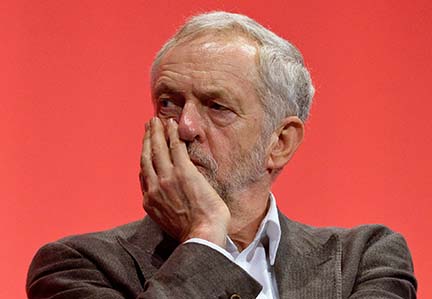

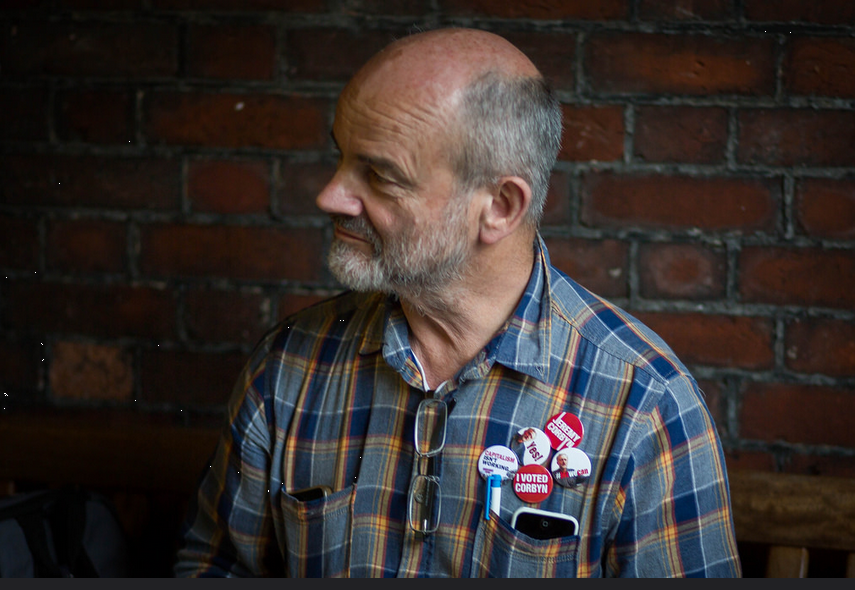
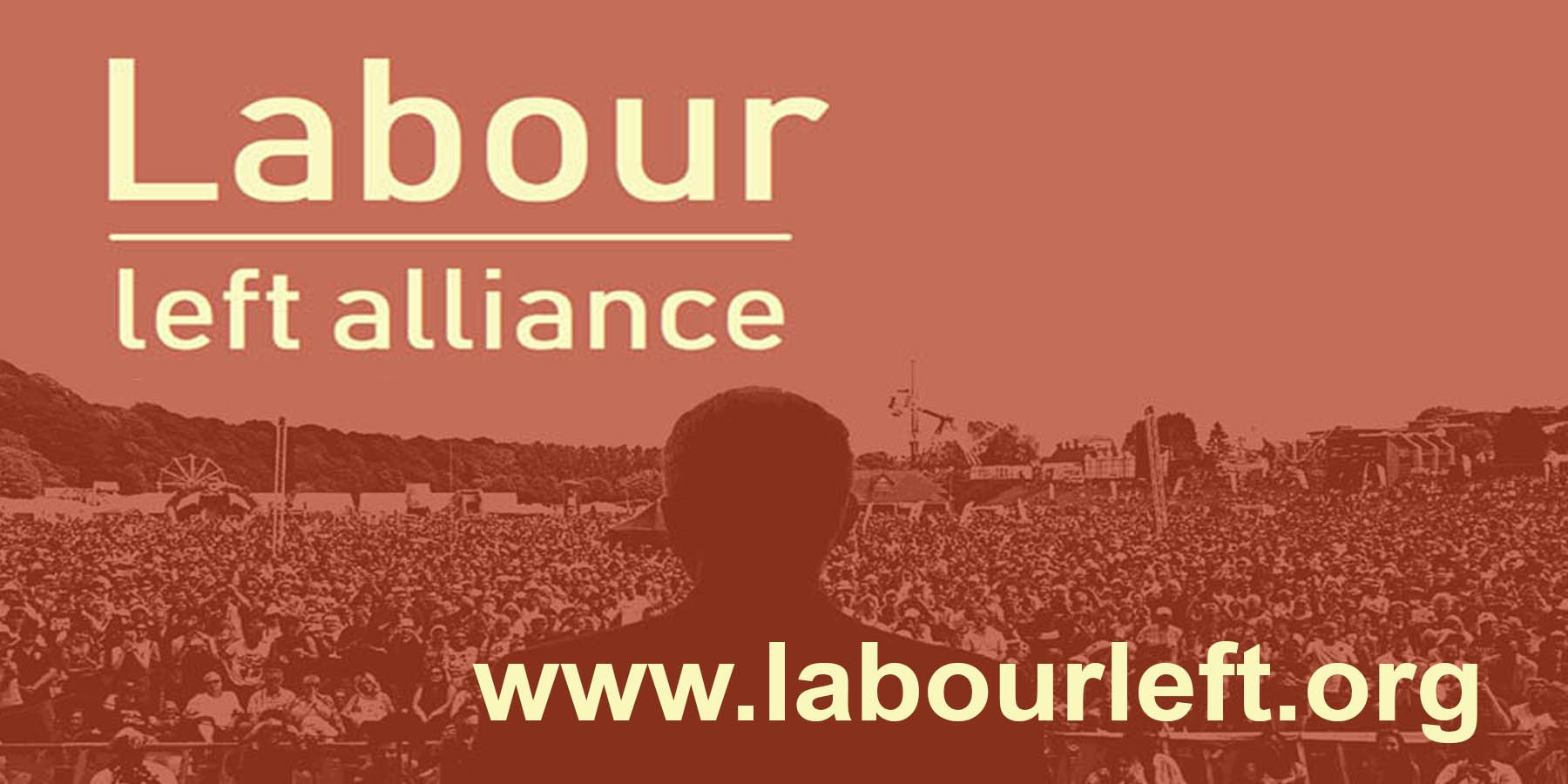
 In the run-up to conference, a vicious campaign against the anti-witch-hunt left had led to the cancellation of various venues booked by Jewish Voice for Labour, Labour Against the Witchhunt and the Labour Representation Committee. However, in record time, comrades from the newly established Brighton Labour Left Alliance worked absolute miracles and booked the Rialto Theatre to allow some of the cancelled meetings to take place. They even worked out a programme of ‘Free Speech events’ that went beyond what was planned in the first place. Over three days, they managed to put on a range of exciting events, featuring Chris Williamson MP, Jackie Walker, Kerry Anne Mendoza and others. The venue of LAW’s main fringe event had to be kept secret, but, with almost 200 people attending, it was standing room only. The left showed that it will not be cowed or intimidated.
In the run-up to conference, a vicious campaign against the anti-witch-hunt left had led to the cancellation of various venues booked by Jewish Voice for Labour, Labour Against the Witchhunt and the Labour Representation Committee. However, in record time, comrades from the newly established Brighton Labour Left Alliance worked absolute miracles and booked the Rialto Theatre to allow some of the cancelled meetings to take place. They even worked out a programme of ‘Free Speech events’ that went beyond what was planned in the first place. Over three days, they managed to put on a range of exciting events, featuring Chris Williamson MP, Jackie Walker, Kerry Anne Mendoza and others. The venue of LAW’s main fringe event had to be kept secret, but, with almost 200 people attending, it was standing room only. The left showed that it will not be cowed or intimidated.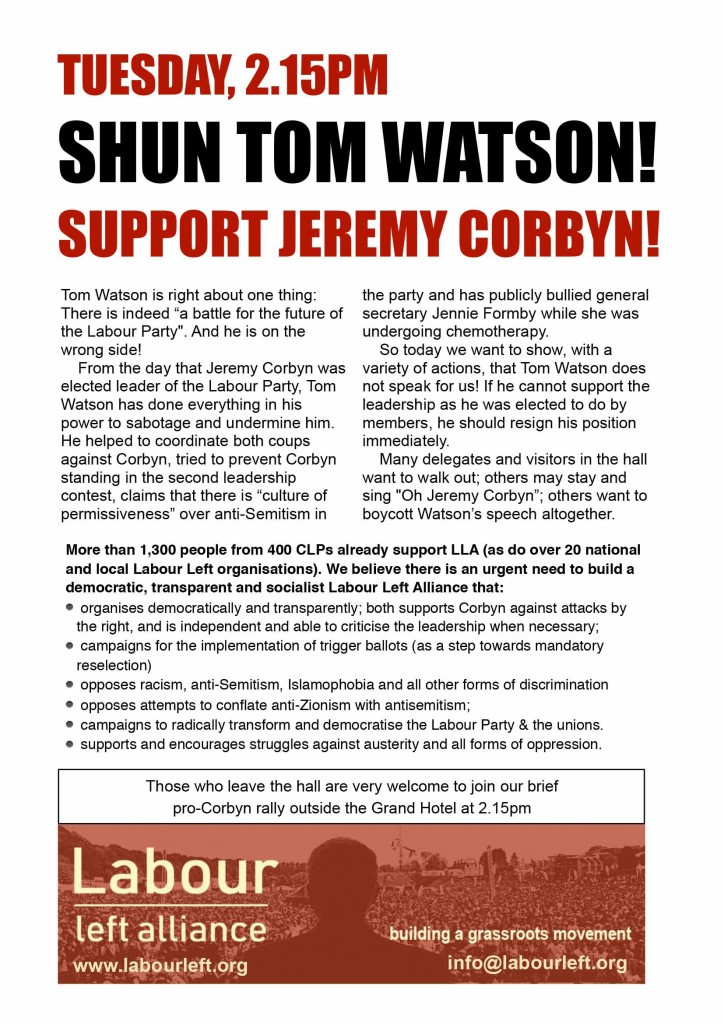 This leaflet explained that a number of delegations were planning to walk out during Watson’s speech, while others were planning to sing “Oh Jeremy Corbyn”. (As an aside, Unite delegates were apparently intending to ‘sit on their hands’ – a rather lame tactic, which, as one sarky commentator at conference put it, “sounds like it could be a Monty Python sketch”.) A WhatsApp group with over 60 people from various delegations and left groups swiftly sprang up during conference and worked closely together to plan for the action. Almost 1,000 copies of a quickly produced LLA leaflet were handed out to delegates and visitors by LLA supporters – and the reception was overwhelmingly positive. Funnily enough, the only negative reaction came from members of (how to say this nicely?) longer established groups on the Labour left, who angrily told us, “unless we can win this, we should not organise such stupid stunts”. Self-defeating attitude or what?
This leaflet explained that a number of delegations were planning to walk out during Watson’s speech, while others were planning to sing “Oh Jeremy Corbyn”. (As an aside, Unite delegates were apparently intending to ‘sit on their hands’ – a rather lame tactic, which, as one sarky commentator at conference put it, “sounds like it could be a Monty Python sketch”.) A WhatsApp group with over 60 people from various delegations and left groups swiftly sprang up during conference and worked closely together to plan for the action. Almost 1,000 copies of a quickly produced LLA leaflet were handed out to delegates and visitors by LLA supporters – and the reception was overwhelmingly positive. Funnily enough, the only negative reaction came from members of (how to say this nicely?) longer established groups on the Labour left, who angrily told us, “unless we can win this, we should not organise such stupid stunts”. Self-defeating attitude or what?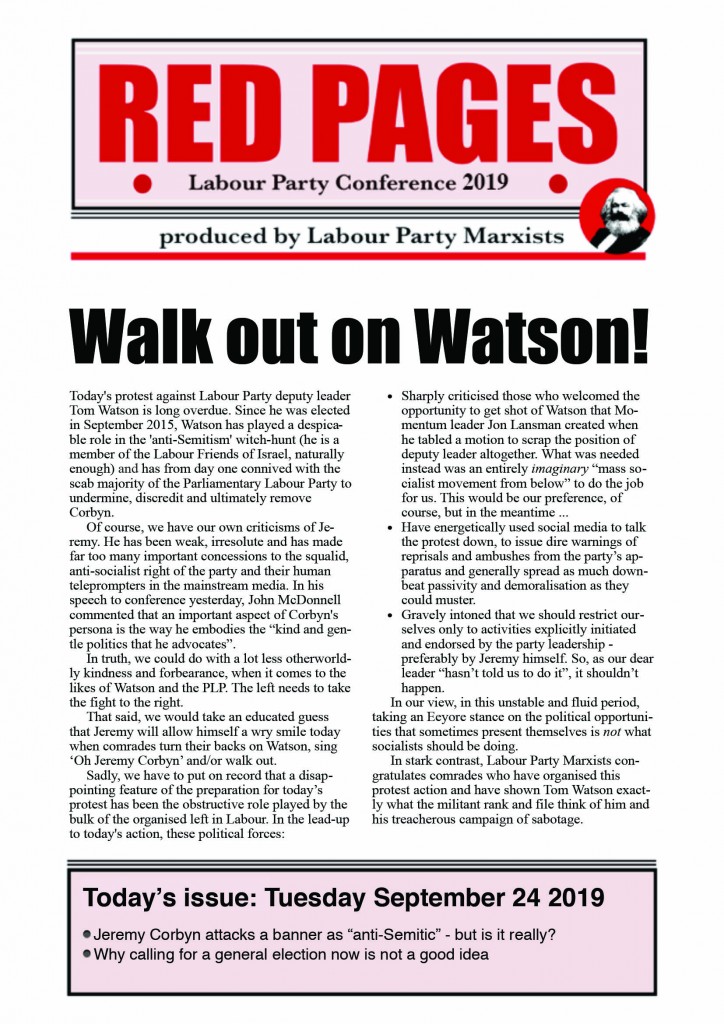 From our interaction with delegates and observers (LPM comrades handed out the LLA leaflet and our daily
From our interaction with delegates and observers (LPM comrades handed out the LLA leaflet and our daily 